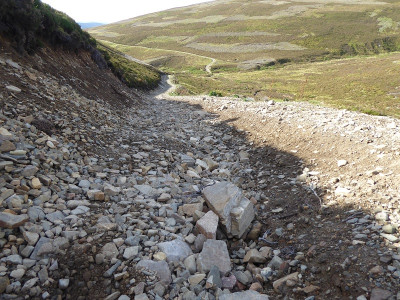Monday 17th June 2019, 2:05pm

A coalition of ten conservation charities is calling on the Scottish Parliament to grasp a golden opportunity to introduce stronger controls over vehicle tracks in our hills.
The Scottish Parliament is set to vote this week on Planning Bill amendments by Scottish Green Party MSP Andy Wightman, designed to close loopholes that allow landowners to build many of the controversial tracks without planning permission.
Research by Scottish Environment LINK Hilltracks group has found that the tracks continue to creep further into wilder landscapes, and that planning loopholes can lead to them being badly-sited and designed.
Some tracks have even been built over the top of narrow, low-impact trails and historical routes, with little chance for the public to comment in advance.
Helen Todd, co-convenor of LINK Hilltracks group and Ramblers Scotland’s campaigns and policy manager, said: “There is a compelling case for stronger controls over vehicle roads in our hills – to boost local democracy, improve construction standards and protect precious environments.
“For too long, landowners have been able to expand tracks further and further into wild landscapes with little oversight from authorities or the public.”
Lovers of Scotland’s outdoors are being encouraged to make their voices heard, by writing to MSPs using a simple online form at ramblers.org.uk/hilltracks.
Beryl Leatherland, co-convenor of the group and also convenor of Scottish Wild Land Group said: “This week’s vote offers MSPs the chance to get a grip on this damaging activity, by changing the law to protect our countryside. We urge all hillgoers to email their MSPs to raise their concerns using our quick online form.”
Scottish Environmental LINK’s Hilltracks group includes Ramblers Scotland, RSPB Scotland, National Trust for Scotland, Scottish Wild Land Group, John Muir Trust, Association for the Protection of Rural Scotland, Badenoch and Strathspey Conservation Group, Cairngorms Campaign, North East Mountain Trust, Scottish Campaign for National Parks and Scottish Wild Land Group.
Mountaineering Scotland Chief Executive Officer Stuart Younie said: "Mountaineering
Scotland fully supports Scottish Environment LINK in their campaign to secure
improved regulation of vehicle tracks in the uplands and has been working
with The Munro Society to catalogue photographs which provide a compelling
evidence base of the damage that is being done. This issue is a real concern to
many of our members and I hope that the Scottish Parliament takes notice as
improved accountability and scrutiny of these tracks is long overdue.”
Mr Wightman’s previous amendments to tackle the spread of hill tracks were voted down by a seven-person committee last November, but this time all 129 MSPs can vote.
The latest amendments would require full planning consent for tracks:
After decades of campaigning from environment and recreation bodies, the Scottish Government launched a new system in 2014 requiring landowners to tell authorities before building agricultural and forestry tracks – but generally full planning permission is not required.
Photo by Nick Kempe.
Become a member of Mountaineering Scotland and add your voice to our campaigns and work to protect access rights and encourage sustainable mountain environments.
As a not-for-profit organisation, we offer membership to anyone who loves Scotland's mountains - whether you walk, climb or ski, no matter where you are from or your ability or fitness. In return, you get liability insurance, our quarterly magazine, a range of discounts and member offers, access to mountain huts, subsidised mountain skills and climbing courses, and opportunities to get involved in consultations and the future of the organisation.